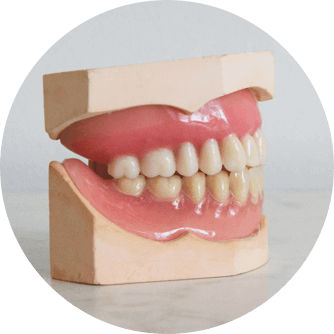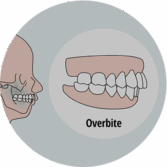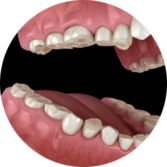Sensitive Teeth
Sensitive teeth are a common issue that many individuals experience,
yet is often left untreated. This condition is defined by a sudden and sharp
tooth pain that can be triggered by various foods or drinks, such as
sipping hot coffee, a bite of ice cream, or even a gust of cold air.
Sensitive Teeth Problems
What Causes Sensitive Teeth?
What exactly leads to a tooth’s heightened sensitivity? Several factors are at play, and understanding these can help in effectively managing and treating the condition.
One of the primary causes is enamel erosion. Enamel can wear away due to various reasons, including consuming highly acidic foods and beverages, using a hard-bristled toothbrush, or brushing vigorously. This erosion exposes the dentin, which contains tiny tubes leading to the tooth’s nerve centre; when exposed to certain foods and drinks, these nerves can produce pain.
Gum disease is another possible cause of sensitive teeth. It causes the gums to recede, pulling away from the teeth and exposing the roots. These exposed areas are not covered by enamel and are therefore more sensitive.
Other contributing factors include habits like teeth grinding, which can wear down teeth, and dental procedures, such as teeth whitening, that may temporarily increase tooth sensitivity. Even cracked or chipped teeth can play a role, as they create new pathways to reach the nerves.

Immediate Relief: How to Stop Tooth Sensitivity Immediately
For those looking for quick relief, several methods can help soothe sensitive teeth. Switching to a desensitising toothpaste is one of the most effective and straightforward solutions. These toothpastes contain compounds that block the transmission of pain signals from the surface of your tooth to the nerve. Additionally, using a soft-bristled toothbrush and brushing gently can prevent further damage to your enamel and gums.
Home remedies can also offer relief. A saltwater rinse, for example, can reduce inflammation and pain. Mixing a teaspoon of salt in a cup of warm water and using it as a mouth rinse can create an osmotic effect, which helps to reduce swelling and discomfort.
Long-Term Solutions: How to Fix Tooth Sensitivity
For more permanent solutions for fixing tooth sensitivity, professional dental treatments are recommended.
One common treatment is the application of fluoride gels or varnishes, which can strengthen enamel and reduce pain sensitivity. In cases where gum recession is the primary cause, a dentist might perform a gum graft to cover the exposed root.
Dental bonding, where a resin is applied to the sensitive areas of the teeth, can also be effective. This procedure covers the exposed dentin, preventing exposure to the triggers of sensitivity. For severe cases, a root canal may be recommended. This treatment addresses problems in the dental pulp, removing the nerves and thereby eliminating sensitivity.

Is it time to straighten your teeth and bring back your confident smile?
We’re human & we’re here to help
Fill out this contact form and we’ll be in touch
























